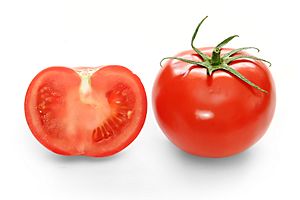Nix v. Hedden facts for kids
Quick facts for kids Nix v. Hedden |
|
|---|---|

|
|
| Submitted April 24, 1892 Decided May 10, 1893 |
|
| Full case name | John Nix, John W. Nix, George W. Nix, and Frank W. Nix v. Edward L. Hedden, Collector of the Port of New York |
| Citations | 149 U.S. 304 (more)
13 S. Ct. 981; 37 L. Ed. 745; 1893 U.S. LEXIS 2303
|
| Prior history | Judgment for defendant, 39 F. 109 (C.C. S.D.N.Y. 1889) |
| Subsequent history | None |
| Holding | |
| Tomatoes are "vegetables" and not "fruit" within the meaning of the Tariff Act of 1883 based on the common meaning of those words. | |
| Court membership | |
| Case opinions | |
| Majority | Gray, joined by unanimous |
| Laws applied | |
| Tariff Act of 1883 (Mongrel Tariff) | |
Nix v. Hedden was a famous court case in 1893. The Supreme Court of the United States had to decide if a tomato was a fruit or a vegetable. This wasn't just for fun; it was about a tax! The Court decided that for tax purposes, tomatoes are vegetables. They said the law should use the everyday meaning of words, not the scientific one.
Contents
The Great Tomato Debate: Why a Case?
The story began with a company called John Nix & Co. They sold lots of fruits and vegetables in New York City. In 1883, a new law called the Tariff Act of 1883 was passed. This law said that imported vegetables had a tax on them, but fruits did not.
John Nix & Co. imported tomatoes. They believed tomatoes should not be taxed. Why? Because, scientifically, a tomato grows from the flowering part of a plant and has seeds. This makes it a fruit in botanical terms.
So, the company sued Edward L. Hedden. He was the person in charge of collecting taxes at the port of New York. John Nix & Co. wanted their tax money back.
What Did They Argue in Court?
During the trial, lawyers for John Nix & Co. showed definitions of "fruit" and "vegetable" from famous dictionaries. These included Webster's Dictionary and Imperial Dictionary.
They also brought in two people who had sold fruits and vegetables for 30 years. These witnesses were asked if the words "fruit" and "vegetable" had a special meaning in the business world. Both witnesses said no. They agreed that the words meant the same in business as they did in the dictionaries.
The lawyers for both sides used dictionaries to support their arguments. The company's lawyers read definitions of "tomato." The government's lawyers read definitions of other items. These included peas, eggplants, cucumbers, squashes, and peppers. Then, the company's lawyers read definitions for potatoes, turnips, and cabbage. This showed how confusing the definitions could be!
The Court's Big Decision
The Supreme Court made a unanimous decision. This means all the judges agreed. They decided that the tomato should be taxed as a vegetable. They based this on how people commonly use and think about tomatoes.
Justice Horace Gray wrote the Court's opinion. He explained that dictionary definitions of "fruit" often mention seeds. But he said these definitions don't show that tomatoes are "fruit" in everyday talk. They also don't show that tomatoes are fruit under the tax law.
Justice Gray said that when a law uses common words, the court should use their ordinary meaning. Dictionaries can help, but they are not the final proof. He agreed that, scientifically, a tomato is a fruit. But he pointed out that people usually eat tomatoes as part of a main meal, not as a dessert.
He also mentioned another case about beans. In that case, the court decided that even though a bean is scientifically a seed, it's seen as a vegetable in everyday language. Justice Gray also clarified that cucumbers, squashes, peas, and beans are all considered vegetables in common use.
Why This Case Still Matters
The Nix v. Hedden case is still important today. It helps courts understand how to interpret laws. It teaches that when a law uses everyday words, courts should use the common meaning. This is especially true if those words don't have a special meaning in a particular business.
For example, in 2005, lawmakers in New Jersey wanted to make the tomato their official state vegetable. They used the Nix v. Hedden case to support their idea! It shows how a court case about a simple tomato can have a lasting impact.
 | Bayard Rustin |
 | Jeannette Carter |
 | Jeremiah A. Brown |


